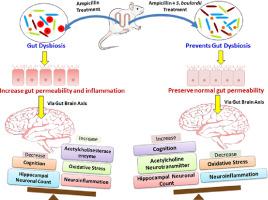Physiology & Behavior ( IF 2.4 ) Pub Date : 2021-03-31 , DOI: 10.1016/j.physbeh.2021.113411 Suparna Roy Sarkar 1 , Papiya Mitra Mazumder 1 , Kaberi Chatterjee 1 , Abhishek Sarkar 1 , Maria Adhikary 2 , Kunal Mukhopadhyay 2 , Sugato Banerjee 3

|
Saccharomyces boulardii, a probiotic yeast is well prescribed for various gastrointestinal disorders accompanied by gut dysbiosis such as inflammatory bowel disease, bacterial diarrhea and antibiotic associated diarrhea. Gut dysbiosis has been associated with central nervous system via gut brain axis primarily implied in the modulation of psychiatric conditions. In the current study we use Saccharomyces boulardii as a therapeutic agent against gut dysbiosis associated cognitive decline.
In mice, gut dysbiosis was induced by oral Ampicillin Na (250 mg/kg twice-daily) for 14 days. While in the treatment group S. boulardii (90 mg/kg once a day) was administered orally for 21 days along with 14 days of antibiotic treatment. Gene expression studies revealed antibiotic mediated decrease in the Lactobacillus, Bifidobacterium, Firmicutes and Clostridium which were restored by S. boulardii treatment. Cognitive behavioral studies showed a parallel reduction in fear conditioning, spatial as well as recognition memory which were reversed upon S. boulardii treatment in these animals. S. boulardii treatment reduced myeloperoxidase enzyme, an inflammatory marker, in colon as well as brain which was increased after antibiotic administration. Similarly, S. boulardii reduced the brain acetylcholine esterase, oxidative stress and inflammatory cytokines and chemokines which were altered due to antibiotic treatment. S. boulardii treatment also protected hippocampal neuronal damage and restored villus length and crypt depth thus normalizing gut permeability in antibiotic treated animals.
Hence, we conclude that S. boulardii prevented antibiotic associated gut dysbiosis leading to reduced intestinal and brain inflammation and oxidative stress thus preventing hippocampal neuronal damage and eventually reversing gut dysbiosis associate cognitive decline in mice.
中文翻译:

酿酒酵母可改善肠道营养不良相关的认知功能减退
益生菌酵母Saccharomyces boulardii被很好地规定用于各种胃肠道疾病,并伴有肠道功能异常,例如炎症性肠病,细菌性腹泻和抗生素相关性腹泻。肠道功能失调已通过肠道脑轴与中枢神经系统相关,这主要暗示着精神疾病的调节。在当前的研究中,我们使用了酿酒酵母作为针对肠道营养不良相关的认知功能下降的治疗剂。
在小鼠中,口服氨苄西林钠(250 mg / kg每天两次)诱导肠道功能障碍14天。在治疗组中,口服博拉氏链球菌(每天一次90 mg / kg)21天,同时进行14天抗生素治疗。基因表达研究表明,抗生素介导的乳酸杆菌,双歧杆菌,菌毛和梭状芽胞杆菌减少,这些细菌可通过布拉德氏链球菌治疗得以恢复。认知行为研究显示,在这些动物中,恐惧条件,空间记忆和识别记忆的平行减少,在布尔氏链球菌治疗后被逆转。猪链球菌这种治疗减少了结肠和大脑中的炎症标志物髓过氧化物酶,在施用抗生素后,这种过氧化物会增加。同样,布拉德氏链球菌减少了脑部乙酰胆碱酯酶,氧化应激以及炎性细胞因子和趋化因子,这些因抗生素治疗而改变。猪链球菌的治疗还可以保护海马神经元损伤,并恢复绒毛长度和隐窝深度,从而使经抗生素处理的动物的肠道通透性正常化。
因此,我们得出的结论是,猪链球菌预防了与抗生素相关的肠道营养不良,从而减少了肠道和大脑的炎症以及氧化应激,从而预防了海马神经元的损害,并最终逆转了小鼠肠道营养不良的认知能力下降。











































 京公网安备 11010802027423号
京公网安备 11010802027423号